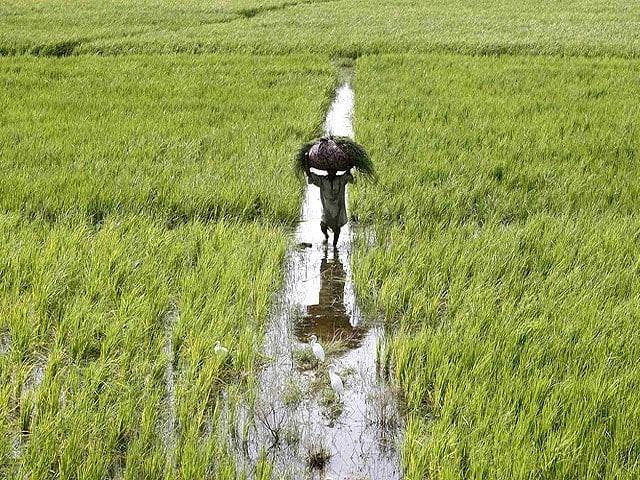Options for reform: Tax the privileged on agriculture income
A starting point will be to tax 1% of the land-owning elite

PHOTO: REUTERS
Agriculture constitutes one-fifth of the national economy with nearly 60% share in exports and provides means of living to 42.3% of the labour force.
However, public policy for the agriculture sector has been disappointing. Despite contributing one-fifth of GDP, agriculture accounted for less than 1% of provincial taxes and 0.09% of federal taxes in 2016.
The subsidies in the agriculture sector outweighed the agriculture income tax by a factor of 24 in 2016, reflecting persistent fiscal indiscipline in Pakistan. To improve their fiscal position, provinces must introduce a fair and equitable system of direct taxes in agriculture, especially for large landowners.
During the colonial rule, in order to incentivise landlords, the colonial administration granted central tax exemptions for agricultural income under the Government of India Acts of 1919 and 1935. Pakistan has continued with this legacy in all three of its Constitutions 1956, 1962 and 1973.
The generous privileges and incentives accorded to the landlords remain the primary cause of failure of reform efforts in agriculture.
For example, Section 4 of the Transfer of Property (Pakistan) Ordinance 1947 provides that “if any right, title or interest in any property whether moveable or immoveable, other than agricultural land, is or had been transferred, assigned, limited, extinguished after the 14th day of August, 1947, an income tax officer may, at any time, issue a notice to all or any of the parties of the transaction, requiring them to produce within one month the income tax certificate, and if such certificate is not produced, he may forward a statement to the Collector, showing the existing and anticipated tax liabilities of each or any of the said parties.”
Discrimination
Such legal discrimination certainly protected the economic interests of would-be elite class of landowners in the upcoming years. This was the class from which came 70% representatives from West Pakistan as compared to no landlord representative from East Pakistan in the first (1948-54) and second constituent assembly (1954-56).
The legacy of feudal elite continued for long and, of course, this had long-lasting imprints on Pakistan’s economy, resulting in failure of every reform effort.
Dr Mehbubul Haq, the then finance minister while speaking at a pre-budget session on June 13, 1985 in parliament, recorded his protest as despite his request to members of parliament to suggest amendments to the finance bill, particularly regarding agriculture tax on rich landlords, it was not taken up. The generous exemptions afforded special protection to economic interests of the privileged land-owning elite, which added to rural inequality in the agricultural sector.
The Agriculture Census of Pakistan 2010 reveals that 1.1% of farms command 21.6% of the total cultivated area, with each farm larger than 20 hectares.
On the other hand, 64.7% of farms account for only 19.2% of the total holdings, with each farm area less than two hectares. These numbers are self-explanatory and demonstrate the stark rural inequality in Pakistan.
The agriculture sector has historically been under-taxed and over-subsidised in Pakistan, disproportionately benefitting large farm-owners. This is because subsidies are applied per unit of consumption, so small farm-owners, who consume less, get lower subsidy while large farm-owners consume more units and get a larger share of the pie.
Furthermore, generous tax exemption has resulted in tax evasion as incomes from other sectors are falsely reported as agriculture income to receive exemptions.
The provincial agriculture income tax legislations provide two options for taxation. First regime is based on land tax under which up to 25 acres of irrigated land and 50 acres of un-irrigated land are exempt from the provincial income tax.
The second option is the assessment of farm income with exemption up to Rs80,000 and the farmers may opt for either of the option – the former option is usually preferred.
Issues and prospects
Studies on agriculture income tax in Pakistan reveal optimal potential for resource mobilisation, but there are many constraints.
First, not everyone deriving income from agriculture necessarily owns the land. Therefore, credible records of landowners, share-croppers and tenants are required.
Second, the absence of records on the produce, farm-gate prices and costs of agriculture inputs is the major constraint to calculating the taxable income and liability.
For a workable administrative tax mechanism, the Pakistan Bureau of Statistics may be requested to administer the farm-gate prices of crops and costs of agriculture inputs.
Provincial governments have an option to consolidate and computerise the Crop Reporting Service records with their Boards of Revenue and Federal Board of Revenue’s record to identify the potential tax base and prevent other business incomes and profits from illegal reporting as agriculture income.
After development of the above framework, the agriculture income may be taxed based on the tax rates applicable to the business income under the Income Tax Ordinance 2001. This will ensure equitable treatment of agriculture and non-agriculture incomes.
Reforming the agricultural tax system will be a gradual process. However, it is a necessary undertaking if provinces wish to improve their fiscal position.
A feasible starting point will be to tax the most privileged 1% of land-owning elite, who own over 20% of farmland in Pakistan. As a result, the government would improve its budgetary position and acquire sufficient funds for social protection, input subsidies, price support and enhancement of irrigation facilities.
The writer is a PhD scholar in the Institute of Business Administration, Karachi.
Published in The Express Tribune, June 26th, 2017.
Like Business on Facebook, follow @TribuneBiz on Twitter to stay informed and join in the conversation.



















COMMENTS
Comments are moderated and generally will be posted if they are on-topic and not abusive.
For more information, please see our Comments FAQ